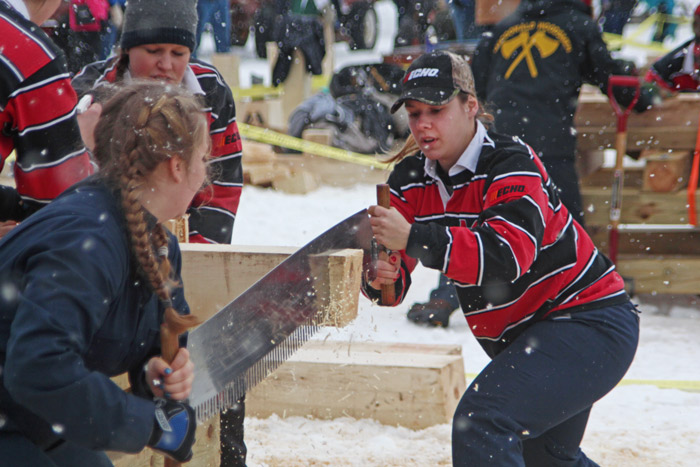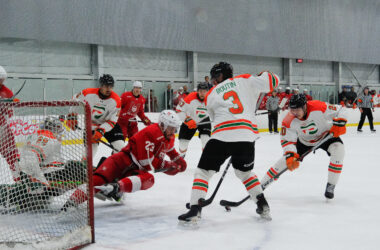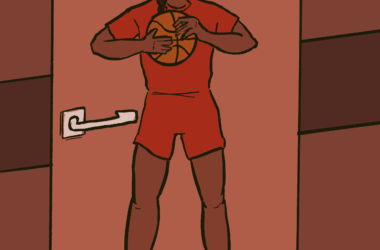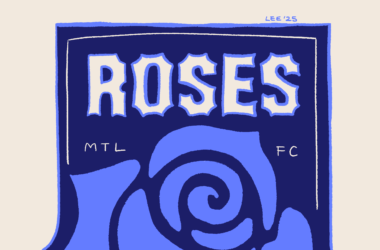The 57th Annual Intercollegiate Woodsmen Competition brought fast-paced action, roaring crowds, and the scent of freshly chopped wood to McGill’s Macdonald Campus on Saturday, Jan. 28. The suspense was palpable from the 9 a.m. ceremonial first cut to the dangerous water boil finale.
For those unacquainted with the tradition of the Woodsmen Games, the event is a series of high-octane lumberjack-inspired competitions. There are both single competitor and team-based events with results translated into cumulative sores for the Canadian and American universities present. McGill’s lumberjill’s placed first, while the lumberjacks finished fourth. The day’s action was broken up into morning and afternoon sessions.
“The morning events are more sign-in events, […] you sign in and you [compete],” McGill Woodsmen captain Dominic Mercier-Provencher said. “But for the afternoon, it will be more concurrent. Every school competes at the same time doing the same events.”
The first session was filled with enthralling action in events like the pole climb, axe throw, and—the Mac campus special—the snowshoe race. In the race, athletes compete in a 1.5km race while wearing snowshoes, tremendously increasing the difficulty of sprinting tremendously.
After the excitement of the morning events, both athletes and spectators alike retreated from the heavy snow into the Ceilidh Bar for beer, chili, and coffee. Despite the weather, the crowd seemingly doubled in size when the competition resumed for the afternoon.
“For me, I like [the afternoon] better,” Mercier-Provencher said. “It gives you an idea of how well you did against the other teams. We’ll have the underhand chop, swede saw, and crosscut saw.”
While the morning was great fun, the afternoon took the intensity to an entirely new level. The first events of the session- swede and crosscut saws-were phenomenal displays of pure power and timing on the saw exchanges. Each event consisted of teams making cuts through blocks of wood with athletes rotating positions throughout the competition. At times, the entire structure holding the block would shake despite the other four members of the team weighing it down. While McGill’s lumberjacks were impressive, the lumberjills showed a tenacity and level of skill well above the competition.
The underhand chop soon followed and brought a heightened sense of danger to the proceedings. Each team of two athletes stood on top of a block and slashed down, with the first member chopping towards the middle on both sides of the stick. As soon as they finished, the second began in earnest. The chop is so dangerous that athletes wore chainmail on their legs and feet to prevent severe injuries. Multiple times, the competitors were centimetres away from severing their own foot. The whole spectacle was equal parts petrifying and exhilarating with each successive heat bringing more danger.
After the life-threatening nature of the underhand, the quarter split was needed to bring both comedy and brevity to the afternoon. Consisting of teams of two, the event centred around each member attempting to first chop a log in half, then break it into quarters. While this may seem straightforward, the logs went flying after the first cut, causing the lumberjacks to sprint after the chunks of wood trying to split the remaining timber.
The day ended with the pièce de résistance—the water boil. The day’s most dangerous event featured innovation, fire, and engineering prowess all rolled into one quick-fire competition.
“The water boil consists of a can and a little bit of water and soap,” Mercier-Provencher said. “You have to build a fire and make the water boil as fast as you can. It’s really fun.”
Like the rest of the day’s events, this too was exceedingly dangerous. When trying to get the perfect thickness of wood to start the fire, the woodsmen repeatedly attempted to make precise cuts downwards on the log, often coming within inches of losing a thumb. After starting the fire, the athletes then built a miniature pyre to allow the flames to encompass the can. By this point, each of the competitors lay down beside the fire, acting as a human billow for the flames. As soon as the first hint of the soapy water boiled over the can, the crowd exploded.
While these events may seem like nothing more than jazzed-up menial tasks, the competitive environment and skill all added to the day, making it greater than the sum of its parts. Anyone with the opportunity should check out the event next year.
“It’s a very nice day, everyone should come to see us,” Mercier-Provencher said. “We practice hard, about four mornings per week. It’s very funny and it’s fun for everyone if people come see and cheer us.”
The experience itself is worth the hour and a half bus and metro trip to Macdonald Campus. It is likely you will never see anything like this again in your life. The whole day is unique and more entertaining than any other free event imaginable on a Saturday.








